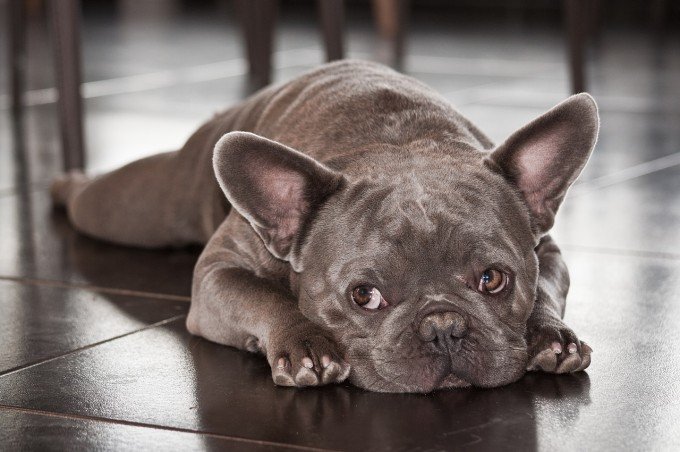French Bulldog Separation Anxiety: How to Treat French Bulldog Separation Anxiety
More than anything else in the world, Frenchies adore their owners. They are prone to separation anxiety and do not perform well when left alone for long periods of time. Some Frenchies are also extremely attached to their owners, following them around the house wherever they go.
Why does Your French bulldog have the separation anxiety?
Contents
- 1 Why does Your French bulldog have the separation anxiety?
- 2 Can French bulldogs be left alone?
- 3 How do you calm down an anxious French bulldog?
- 4 How to Treat French Bulldog Separation Anxiety
- 5 Do French Bulldogs get attached to people?
- 6 How do You know if Your Frenchie is stressed?
- 7 Can French Bulldogs sense sadness?
- 8 Do French Bulldogs get jealous?
- 9 Are Frenchies emotional?
- 10 Why does my Frenchie always look sad?
- 11 Do dogs feel love when you kiss them?
- 12 Why do dogs lick you?
- 13 What does it mean when a dog puts his paw on you?
- 14 Do French Bulldogs get mad?
- 15 Do dogs know when you cry?
- 16 Is it bad to cry in front of your dog?
- 17 Why do dogs look at you when they poop?
- 18 Are French Bulldogs hard to train?
- 19 Do dogs like it when you talk to them?
Because of their playful nature and yearning for friendship, French Bulldogs are particularly prone to separation anxiety. These characteristics make French Bulldogs fantastic pets, but they also make them less independent by nature.
Can French bulldogs be left alone?

The answer is Yes. Your Frenchie can be left alone for long amounts of time if properly trained. Separation anxiety is more common in Frenchies than in other breeds, but with patience and training, your dog’s time away from you will become more manageable.
How do you calm down an anxious French bulldog?
Anxiety, over-excitement, or boredom can cause a Frenchie to become hyperactive.
Here are some suggestions for helping your Frenchie relax:
- Experiment with aromatherapy.
- Use caution when it comes to your energy.
- Take walks with your dog.
- Keep the dog occupied.
- Don’t be affectionate.
- Ignore your canine companion.
How to Treat French Bulldog Separation Anxiety

- Allow for both physical and mental stimulation.
- Long before you depart, say your goodbyes to your dog.
- Keep your cool and establish yourself.
- Teach your dog to be self-sufficient.
- Give your dog an excellent audiobook to listen to.
- Maintain a low-key approach to your arrivals and departures.
- Set Up a Safe Confinement Zone for Your Dog or Crate Train It.
- Proactive Exposure Training and Socialization
Do French Bulldogs get attached to people?
French bulldogs are affectionate creatures who lavish their love on their owners. Single-person households may be excellent because the dog would otherwise compete for everyone’s affection. Your French bulldog, on the other hand, will love you until the end of time if you give him enough care.
How do You know if Your Frenchie is stressed?
Whale eye (when dogs display the whites of their eyes), tucked ears, tucked tail, increased hackles, lip-licking, yawning, and panting are all stress symptoms to look for. Your dog may also glance away or avoid eye contact.
There are various symptoms to look for to determine whether or not your dog is stressed.
- Pacing.
- Growling. Growling is an easy method to know if your dog is in pain.
- Body Language is an essential aspect of communication.
- Freezing.
- Whining or barking, that is the question. When dogs are agitated, they often can’t control their whimpering, an instinctual response.
Can French Bulldogs sense sadness?
Researchers concluded that not only do Frenchies detect our emotions, but they also tend to adopt them as their own.
Do French Bulldogs get jealous?
According to our experience with French Bulldogs, they get along with each other in normal situations, but they are known to be aggressive with dogs of the same sex. This can happen in a variety of situations, including when they are provoked if people get envious of you.
Are Frenchies emotional?
As a lover of French Bulldogs, you’ll observe that they’re usually highly emotional, and they’re definitely very reliant or devoted to their owners. It’s fair to say that Frenchies have a proclivity for being emotionally involved with their owners.
Why does my Frenchie always look sad?
Typically, French Bulldogs get sad for a variety of reasons, including the loss of a partner, family separation, or a difficult time adjusting to environmental changes or being separated from a familiar habitat. There are a few other reasons why your Frenchie might go into hiding.
Do dogs feel love when you kiss them?
When kissing their pets, many dog owners speak to them in a cutesy or gentle tone, and the dog learns to identify kisses with a gentle tone. As a result, they’ll respond appropriately, and once they’ve gotten used to licks and cuddles, they’ll typically return the affection in their own doggie manner.
Why do dogs lick you?
It’s very likely that your dog is kissing you because it adores you! It’s for this reason that they’re commonly referred to as “kisses.” Licking people and other dogs is a common way for dogs to express affection. For dogs, licking is a normal behavior. If they can get to it, dogs may lick your face.
What does it mean when a dog puts his paw on you?
It is devoted to you.
It could be your dog’s way of saying “I love you” if he places his paw on you. If your dog is pawing at you and showing indications of nervousness, it could imply he feels insecure and needs you to comfort him. If the constant pawing is due to begging for food, though, it’s preferable to ignore the behavior.
Do French Bulldogs get mad?
To release pent-up energy or even worry, French Bulldogs will run around like crazy with the zoomies. FRAPS, or frantic random activity periods, is a totally typical tendency that even has a name.
Do dogs know when you cry?
Previous research has found that when people cry, their pets are distressed as well. According to a new study, dogs not only feel distressed when they notice their owners are upset, but they will also strive to help.
Is it bad to cry in front of your dog?
Previous research has found that when people cry, their pets are distressed as well. According to a new study, dogs not only feel distressed when they notice their owners are upset, but they will also strive to help.
Why do dogs look at you when they poop?
You’d think she’d look away in the hopes of gaining some privacy, but she instead locks her gaze on you. That’s because your dog is vulnerable in that pooping position, and she’s looking to you to protect her. Your dog instantly recognizes his helplessness.
Are French Bulldogs hard to train?
Although French Bulldogs are easy to teach, they may sometimes be defiant. When training this breed, be firm but patient. The French Bulldog may not be the dog for you if you value hygiene, as he is prone to drooling, flatulence, and minor shedding. He can be difficult to housetrain as well.
Do dogs like it when you talk to them?
The canines preferred to spend more time with people who spoke to them in “dog-speak” and used “dog-relevant” language, according to the researchers. The dogs respond most positively to the combination of pitch and substance. The findings of the researchers were published in the journal Animal Cognition.




